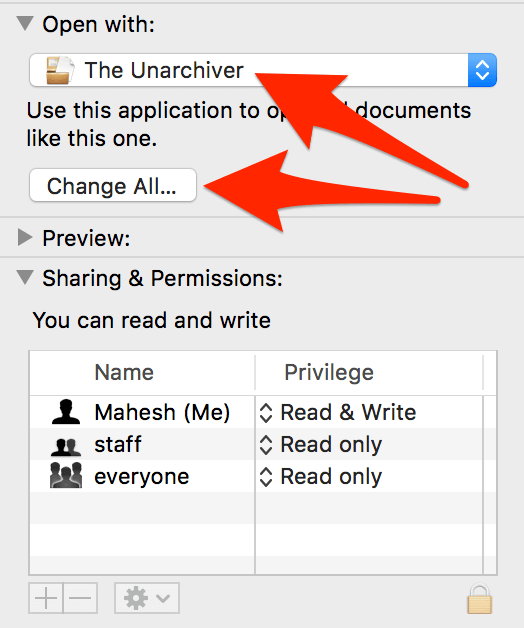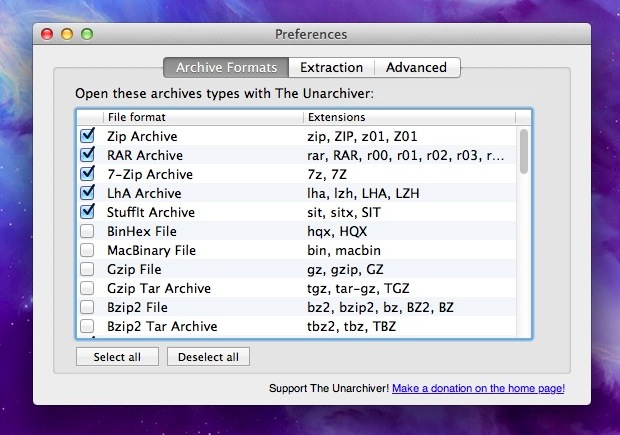

- Cannot be extracted with the unarchiver .exe#
- Cannot be extracted with the unarchiver archive#
- Cannot be extracted with the unarchiver code#
- Cannot be extracted with the unarchiver windows#
Compression will therefore usually reduce the size of a plain text document but hardly affect a JPEG picture or a word processor document. It also has the benefit of reducing the size of files not already efficiently compressed (many compression algorithms cannot make already compressed data any smaller.
Cannot be extracted with the unarchiver code#
They must be distinguished from executable compression, where the executable file contains a single executable only and running the file does not result in the uncompressed file being stored on disk, but in its code being executed in memory after decompression.Īrchiving files rather than sending them separately allows several related files to be combined into a single resource.
Cannot be extracted with the unarchiver archive#
Self-extracting archives can be used to archive any number of data as well as executable files. An early example of a self-extracting archive was the Unix shar archive in which one or more text files were combined into a shell script that when executed recreated the original files. Others (like 7-Zip or RAR) can create self-extracting archives as regular executables in ELF format.

There are also programs that create self-extracting archives on Unix as shell scripts which utilizes programs like tar and gzip (which must be present in destination system). For Macintosh there are StuffIt, The Unarchiver, and 7zX.
Cannot be extracted with the unarchiver windows#
For Windows there is WinZip, WinRAR, 7-Zip, WinUHA, KGB Archiver, Make SFX, the built-in IExpress wizard and many others, some experimental. Several programs can create self-extracting archives. The decompression routines will be different for a LZMA 7z archive when compared with a LZMA2 7z archive, for example. The exact executable code placed at the beginning of a self-extracting archive may therefore need to be varied depending on what options were used to create the archive. For a decompression utility to correctly expand an archive of either the self-extracting or standard variety, it must be able to operate on both the file format and algorithm used. A single file format, such as 7z, can support multiple different compression algorithms including LZMA, LZMA2, PPMd and BZip2. There is additionally a distinction between the file format and compression algorithm used. Some programs can manage (create, extract, or modify) only one type of archive whilst many others can handle multiple formats. There are several functionally equivalent but incompatible archive file formats, including ZIP, RAR, 7z and many others. It will not self-extract under Linux, but can be opened with a suitable Linux archive manager. It could alternatively be converted into somefiles.exe which will self-extract on a machine running Microsoft Windows without the need for that suitable archive manager.
Cannot be extracted with the unarchiver .exe#
exe extension like other executable files.įor example, an archive may be called somefiles.zip - it can be opened under any operating system by a suitable archive manager which supports both the file format and compression algorithm used.

In some cases this requires the self-extracting executable to be renamed to hold a file extension associated with the corresponding packer. Self-extracting archives cannot self-extract under a different operating system but most often can still be opened with a suitable extractor as this tool will disregard the executable part of the file and instead extract only the archive resource.

Non-self-extracting archives contain the archived files only and therefore need to be extracted with a compatible program. to specify the target location or select only specific files to be extracted. Often, the embedded self-extractor supports a number of command line arguments to control the behaviour, i.e. On executing a self-extracting archive under an operating system which supports it, the archive contents are extracted and stored as files on the disk. Users who are unwilling to run the self-extracting file they received (for example, when it may contain a virus) can use the file archiver to view or decompress its content without running executable code. However, file archivers like WinRAR can still treat self-extracting files as any other compressed files. Such a compressed file does not require an external program to decompress the contents of the self-extracting file, and it can run the operation itself. It incorporates an executable file module, a module used to run uncompressed files from compressed files.


 0 kommentar(er)
0 kommentar(er)
